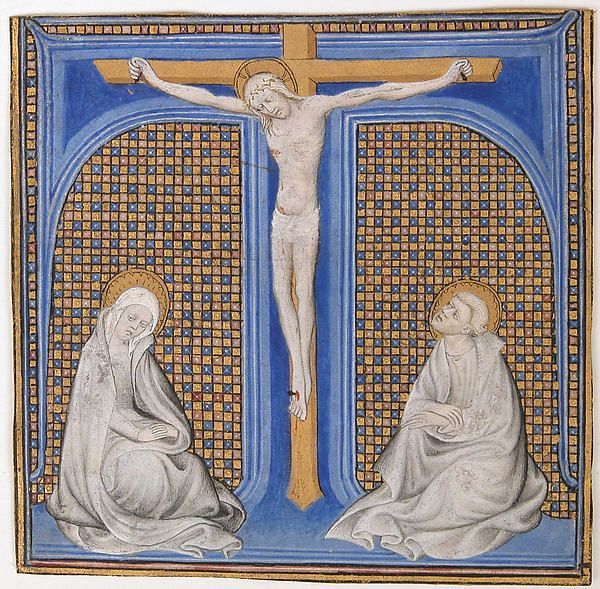Principle and Foundation
1st Part
Prayer: In the preparatory prayer I will beg God our Lord for grace that all my intentions, actions, and operations may be directed purely to the praise and service of his Divine Majesty.
Composition of place: hear God the Creator who saying: “Let us make man in our image and likeness” (Gen 1, 26)
Prayer of petition: it is to ask for light, that I may truly know my origin, my principle, the object of my life here on earth and my eternal end.
The Spiritual Exercises of Saint Ignatius begin with a particular text from which all truth comes from and finds its foundation
Man is created to praise, reverence, and serve God our Lord, and by this means to save his soul.
This is the principle and foundation of our entire lives. The meditation of this truth will be sufficed to sanctify our lives.
Consequently we can say that this truth is the foundation of our sanctity.
God Creator
“What can be known about God is evident to them, because god made it evident to them. Ever since the creation of the world, his invisible attributes of eternal power and divinity have been able to be understood and perceived in what he has made… (Rom. 1, 19)
Sometimes the intelligence of men reaches sublimity. For example, we see this sublimity when man affirms that a masterpiece in wood is attributed to the carpenter, a watch to the watchmaker, but creation to nobody.
Creation is God’s masterpiece. In this work we can see the unmistakable trademark of God. Heaven and earth proclaim the glory of God. Because of this when man rejects God he has no excuse.
“As a result, they have no excuse, for although they knew God they did not accord him glory as God or give Him thanks… (Rom. 1, 21)
Creation speaks about God.
Creation speaks about our principle, because we were created.
“Then God said, ‘Let us make man in our image, after our likeness; and let them have dominion over the fish of the sea, and over the birds of the air, and over the cattle, and over all the earth, and over every creeping thing that creeps upon the earth.” So God created man in his own image, in the image of God he created him; male and female he created them. And God blessed them… and God gave them dominion over everything.
Consequently we cannot understand our very self without God as our principle and origin. In his work of love God put man in the center.
Human Beings are Creatures
We are creatures. We are created. Saint Ignatius says man
is created. It is a very important distinction. He didn’t say
man has been created, but
man is created.
We know that each one of our souls is a masterpiece of God. He is the creator of our souls. God is also the one who keeps us in our existence. Which one of us can say, “tomorrow I will be here.” We cannot say this because we depend on God.
With beautiful words Chesterton explain this idea in his work Saint Francis of Assisi.
“This state can only be represented in symbol…the symbol of inversion…
If a man saw the world upside down, with all the trees and towers hanging head downwards as in a pool, one effect would be to emphasize the idea of dependence. There is a Latin and literal connection; for the very word dependence only means hanging. It would make vivid the Scriptural text which says that God has hanged the world upon nothing….”
We just hang on God. It is a beautiful image that in theology means.
- We’re nothing. We are limited. It is right, we have an immortal soul, that is dressed with the intellect and free will, but after all a limited intellect and will. We experience this when we want to remember something that we had studied but we can’t, or when we want to attain things that we desire but we cannot. We are limited. We are creatures.
- We are nothing and we can do nothing good by ourselves. Jesus Christ told us, “apart from me you can do nothing.” (Jn. 15, 5) It is a rational deduction of the philosophical principle: operari sequitur esse, operation follows nature. If we are limited creatures we will work according to this limited situation.
Why does God Create us
Surely, God has a
motive. Coincidence is not a good reason. God should have a plan for us. So, this question can be ours:
why?
Among the possible answers that we can hear, we can find:
The Communist Answer:
Man was born to work. He is like a piece in the huge machine that is the world. He is like a wheel that runs together with other wheels. As a person he has no value, value is found in his work, his value is measured by his productivity for
society.
This is the invention of Marx and Lenin. This invention brought many people to death, because after all they were not “persons” but wheels.
The Materialist Answer:
The value of things is measured in dollars. How much is the cost of this? According to this price is its value. Money is the keyword.
It is incredible, and sad to see how many people have a sick desire for accumulation. Titles, possessions…
In the last WYD, I asked a twenty years old guy: what is your desire? The answer was:
to eat well, sleep, and be with his girlfriend… I tried to explain to him that he had a soul, and that even though he couldn’t see it, it was within him looking for eternity. But he had no hope for eternity. To him the end was the tomb.
Utilitarian Answer:
If it is useful, it is worthy; if it is not, wipe it out.
If you have little babies with deformations, with physical or mental problems, they are not useful. And what about old people who cannot take care of themselves. They are not useful either. Sickness, sufferings, trials have no sense in the utilitarian world. This world continues saying the blasphemous words of Pharisees and High Priest: “
He saved others; he cannot save himself. Let the Christ, the King of Israel, come down now from the cross, that we may see and believe.” (Mk 15, 31-32)
Hedonist Answer:
Here, pleasure is the keyword, and sacrifice is a bad word. So we find very strange combinations: Love without sacrifice, actions without commitments. Feeling is the main rule. So, if you feel good, all is well.
Consequently the moral question is not if something is good or evil; but the moral question is: how you feel…
Why does God create us? The Catholic answer is:
Man is created to praise, reverence, and serve God our Lord, and by this means to save his soul.
The Ignatian text has four verbs. The three first verbs have a reference to our work, here on earth: to praise, reverence and serve. The last one has a heavenly meaning which is to save our souls.
Man is created to praise with his mind
Why was there nothing and then suddenly something?
Did God have to make something? No, He is, was and always will be infinitely happy all alone.
God does not create to
get, but He creates to
give. “Because He is good, we exist”, says Saint Augustine. God created us to share his infinite goodness with us, to communicate his divine perfections to us. Because goodness is diffusive of itself and tends to pour itself out on others, God created other beings so that they could share His happiness with him.
We were called to this life to praise God for his work and for his goodness to us.
Consequently, we owe Him a debt of praise and thanksgiving.
“What shall I render to the LORD for all his bounty to me?” (Psalm 116, 12)
“Bless the LORD, O my soul; and all that is within me, bless his holy name! Bless the LORD, O my soul, and forget not all his benefits.” (Psalm 103: 1-2)
Man is created to reverence with his will
Man, reverences with his heart. Properly speaking it is the first commandment. We can remember how one of the Pharisees approached Jesus and asked:
“Which commandment in the law is the greatest? And the answer was:
“You shall love the Lord your God, with all your heart, with all your soul, with all your mind…” (Mt 22: 34)
One can sin against God’s love in various ways: (Catechism of the Catholic Church 2094
– indifference
neglects or
refuses to reflect on divine charity; it fails to consider its goodness and denies its power.
–
negligence in responding to divine love; it can imply refusal to give oneself over to the prompting of charity.
–
ingratitude fails or refuses to acknowledge divine charity and to return him love for love.
Our answer must be reverence and adoration. (n.2097)
To adore God is to acknowledge, in respect and absolute submission, the “nothingness of the creature” who would not exist but for God.
To adore God is to praise and exalt him and to humble oneself, as Mary did in the Magnificat, confessing with gratitude that he has done great things and holy is his name.
Man is created to serve with his works.
“Children, let us love not in word or speech but in deed and truth…” (John 3:18)
Works are good deeds and not just arguments. If we believe in God and we love him, it will overflow in good actions.
… and by this means to save his soul.
“What does it profit a man, if he gain the whole world, but suffer the loss of his own soul? Or what will a man give in exchange for his soul?” (Mt. 16:26-27)
Man is a pilgrim and is made to praise, reverence and serve God and thus to save his soul. We must be awakened to this primary purpose of our existence. We are not to live in this world forever.
We can either accept God or reject him. Because of this it is very important to be aware of the consequences of each action and option.
God created us and gave us free will to accept Him, along with the graces necessary for our salvation. God, who has made us without our consent, will not save us without our cooperation.
It is time to review in our lives our relation with God.
Is it God whom we are seeking or our own selfish interests on earth? Is God above all or have we replaced him with other goals? My goals…
If our goal is not
to praise, reverence, and serve God our Lord, we have begun to lose the end and consequently
our soul.



